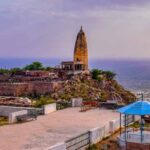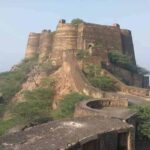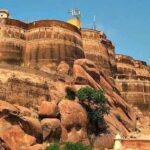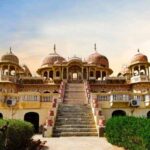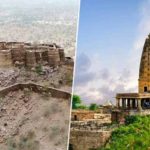Sikar Travel Information, a vibrant city located in the northern Indian state of Rajasthan, is a treasure trove of history, culture, and architectural marvels. Nestled amidst the arid landscapes of the Shekhawati region, Sikar is a lesser-known gem that offers a unique and enriching tourism experience. Rich in historical significance, Sikar boasts a fascinating past that dates back to the medieval era. The city’s roots can be traced to the 17th century when it was founded by Rao Shekha. Over the centuries, Sikar flourished as a prominent center of art, culture, and commerce, which is evident in its well-preserved heritage sites and havelis.
One of the most remarkable aspects of Sikar’s tourism is its stunning havelis or traditional mansions. These grand structures are adorned with intricate frescoes and paintings, showcasing the artistic brilliance of the region. The prominent havelis like Bansidhar Rathi Haveli, Sawant Ram Chokhani Haveli, and Raghunath Ji Temple Haveli are a must-visit for any history or art enthusiast.
The city’s rich architectural heritage extends to its temples and forts. The Sikar Fort, situated atop a hill, offers a panoramic view of the city and its surroundings. The Madho Niwas Kothi, a beautiful palace, and the Sanganeria Haveli are some other architectural marvels that deserve exploration. For the spiritually inclined, Sikar is home to several ancient temples that hold religious and cultural significance. The Raghunath Temple, Jeen Mata Temple, and Gopinath Ji Temple attract pilgrims and tourists alike.
Sikar is also famous for its colorful festivals, where the traditional folk culture comes alive with dance, music, and vibrant processions. The Teej festival, Gangaur festival, and the colorful Holi celebrations are some of the best times to witness the city’s vivacity. Additionally, the local markets of Sikar are a treasure trove for shopaholics. The bustling bazaars offer an array of traditional handicrafts, textiles, and jewelry, making for perfect souvenirs to take back home.
The warm and welcoming locals add to the charm of Sikar tourism, making visitors feel at home away from home. Whether it’s exploring the rich heritage, immersing in the local culture, or simply savoring the delectable Rajasthani cuisine, Sikar promises an unforgettable experience for every traveler.
In conclusion, Sikar stands as a testament to the grandeur of Rajasthan’s cultural heritage, making it a must-visit destination for those seeking an offbeat and enriching tourism experience. From its splendid havelis to its vibrant festivals, Sikar Monuments a delightful blend of history, culture, and hospitality that leaves an indelible mark on the hearts of its visitors.
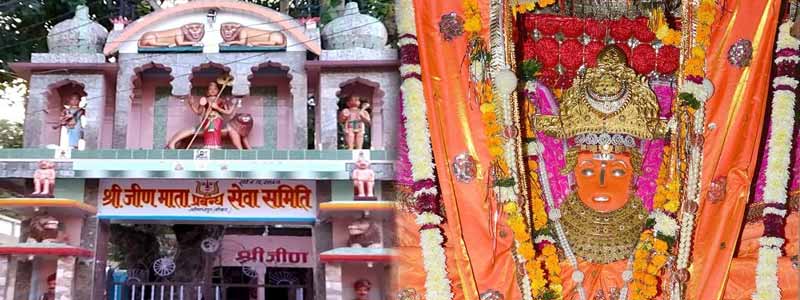
History of Sikar
The history of Sikar can be traced back to ancient times, and the region has witnessed the rise and fall of various dynasties, leaving behind a rich tapestry of historical events and cultural heritage.
The earliest known settlements in the region date back to the Harappan civilization (around 3000 BCE), as archaeological findings have uncovered remnants of this ancient culture in and around Sikar Tour. Over the centuries, the area came under the influence of different ruling powers, including the Mauryas, Guptas, and the Rajputs.
During the medieval period, Sikar was part of the Delhi Sultanate, and it saw its fair share of struggles and conquests as various Rajput clans vied for control. It was in the 18th century when Sikar gained prominence under the rule of the Shekhawat Rajputs, particularly Rao Raja Madho Singh I, who made it the capital of the princely state of Sikar. The Shekhawat clan, belonging to the Kachwaha lineage, played a significant role in the region’s history and development.
Under the Shekhawat rulers, Sikar flourished as a center of art, culture, and architecture. Many of the grand havelis and forts that dot the city’s landscape were constructed during this period. These havelis, adorned with exquisite frescoes and intricate carvings, are a testament to the artistic and architectural prowess of the time.
During the British colonial period, Sikar became a part of the Jaipur princely state, which was under the suzerainty of the British Empire. The rulers of Sikar maintained a friendly relationship with the British, and the region saw various infrastructural developments during this period.
After India gained independence in 1947, Sikar merged with the newly formed state of Rajasthan and became one of its districts. Since then, Sikar has continued to grow and prosper as an important district of Rajasthan, preserving its cultural heritage while embracing modernity.
Today, Sikar stands as a vibrant city with a glorious past, boasting a unique blend of historical architecture, cultural traditions, and warm hospitality. Its historical landmarks and rich heritage make it a popular destination for tourists and history enthusiasts alike Tourist Places Rajasthan.
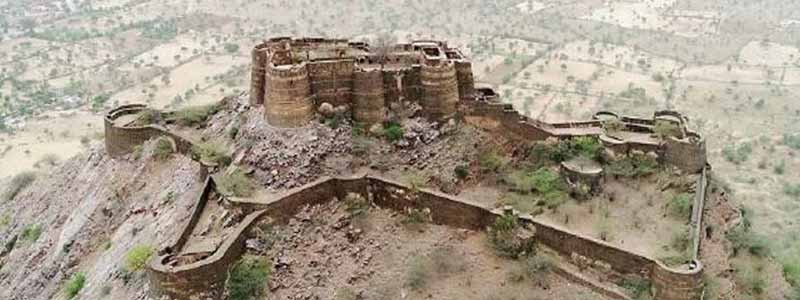
Places to Visit in Sikar
Sikar, located in the beautiful state of Rajasthan, India, is a city filled with historical and cultural wonders. Here are some of the top places to visit in Sikar:
Laxmangarh Fort: This magnificent fort is one of the main attractions in Sikar. Built in the 19th century by Rao Raja Laxman Singh, it offers stunning views of the city and surrounding landscapes. The fort’s architectural grandeur and the intricate artwork on its walls and pillars are truly captivating.
Jeen Mata Temple: Located about 29 kilometers from Sikar, this ancient temple is dedicated to Goddess Durga. Nestled amidst the picturesque Aravalli Hills, the temple attracts pilgrims and tourists alike. The annual fair held during Navratri is a vibrant and colorful event.
Khatushyam Temple: Situated approximately 65 kilometers from Sikar, this famous temple is dedicated to Khatushyamji, a revered deity. It is believed to be around 1000 years old and holds significant religious importance for devotees.
Devgarh: This small town, about 13 kilometers from Sikar, is renowned for its stunning havelis and temples. The Devgarh Fort, surrounded by beautiful gardens, is a prominent attraction that showcases the region’s architectural heritage.
Harshnath Temple: Perched atop the Harshnath hills, this ancient temple dates back to the 10th century and is dedicated to Lord Shiva. Besides its religious significance, the temple’s location offers panoramic views of the surrounding countryside.
Shri Raghunath Ji Temple: An important religious site in Sikar, this temple is dedicated to Lord Rama and is known for its splendid Rajasthani architecture and vibrant festivals.
Harsh Baori: This stepwell, also known as a baori, is an architectural marvel with intricate carvings and a tranquil ambiance. It served as a water source and a social gathering place in ancient times.
Exploring these attractions in Sikar promises a journey back in time, unveiling the city’s cultural heritage and leaving visitors with cherished memories of Rajasthan’s architectural wonders and warm hospitality.
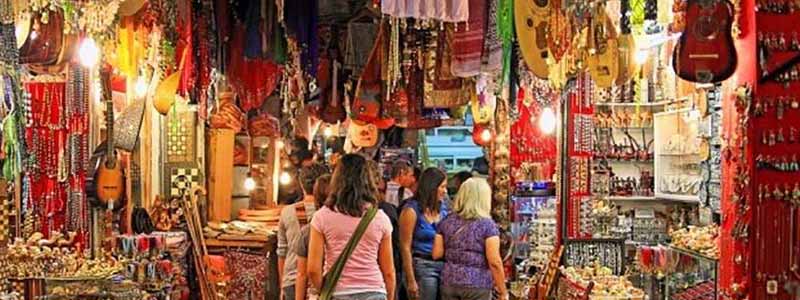
Famous Shopping Markets in Sikar
Sikar, a city with a rich cultural heritage in the state of Rajasthan, India, boasts several vibrant markets that offer a delightful shopping experience for both locals and tourists. Here are some of the famous shopping markets in Sikar:
Fatehpuri Bazaar: Located in the heart of Sikar, Fatehpuri Bazaar is one of the most popular and bustling markets in the city. This vibrant market is known for its wide range of traditional Rajasthani handicrafts, including colorful fabrics, embroidered textiles, traditional jewelry, and decorative items. It’s a great place to buy souvenirs and immerse yourself in the local culture.
Ram Lila Chowk: This market is a treasure trove for shoppers seeking colorful Rajasthani fabrics, vibrant turbans, and traditional attire like lehengas and bandhani sarees. It is also a great place to shop for traditional footwear like mojdis and juttis.
Jubilee Market: As the name suggests, Jubilee Market is a lively and bustling shopping destination in Sikar. It is famous for a variety of products, including household items, kitchenware, electronic goods, and trendy clothing. Bargaining skills come in handy while shopping in this market.
Anaj Mandi Market: This market is known for its wholesale trade of grains and agricultural products, but it also houses shops that sell colorful Rajasthani turbans, fabrics, and handloom textiles. Visitors can find a variety of traditional clothing and accessories at reasonable prices.
Purani (Old) Basti Market: Located in the old part of the city, Purani Basti Market is a charming place to explore. It offers a mix of traditional Rajasthani items, including handicrafts, textiles, and jewelry. The market is also famous for its sweet shops, where you can indulge in local Rajasthani sweets.
Sikar Haat: Sikar Haat is a weekly market that comes alive on Sundays. It is a unique place to experience the vibrant rural life of Rajasthan and find an assortment of local handicrafts, pottery, and agricultural tools. This market is a great place to witness the traditional way of trading in the region.
Lakshya Mall: For those looking for a more modern shopping experience, Lakshya Mall in Sikar offers a mix of branded stores, eateries, and entertainment options. It’s a popular hangout spot for locals and a convenient place to shop for clothing, accessories, and electronics.
When visiting these markets in Sikar, travelers can indulge in the region’s rich culture, pick up traditional Rajasthani souvenirs, and witness the vibrant atmosphere that defines shopping in this historical city.
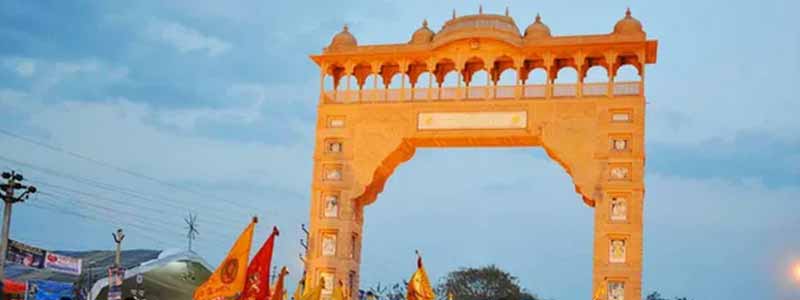
Fair & Festivals of Sikar
Sikar, in the culturally rich state of Rajasthan, India, celebrates a wide array of fairs and festivals throughout the year. These events are an integral part of the city’s cultural heritage, reflecting the region’s vibrant traditions and customs. Here are some of the prominent fairs and festivals celebrated in Sikar:
Sikar Camel Festival: One of the most famous festivals in Sikar, the Camel Festival, is celebrated with great enthusiasm. It usually takes place in the month of January. The festival showcases a colorful parade of beautifully adorned camels, camel races, and various cultural performances. Tourists and locals alike gather to witness the spectacle of these magnificent creatures and participate in the festivities.
Gangaur Festival: Celebrated in the month of Chaitra (March-April), Gangaur is a women-centric festival dedicated to Goddess Parvati. Women dress in traditional attire, carry idols of the deity, and participate in lively processions with music and dancing. The festival celebrates marital bliss and is an important cultural event in Sikar.
Teej Festival: Teej is another significant women’s festival celebrated in Sikar during the monsoon season, usually in July-August. It commemorates the union of Lord Shiva and Goddess Parvati. Married women fast for their husband’s well-being and dress in vibrant green and red attire. The festival is marked by dance, songs, and various traditional rituals.
Ramdevra Fair: Although not in Sikar itself, the Ramdevra Fair is a major event celebrated in nearby regions, and many people from Sikar attend it. This fair honors the folk deity Saint Ramdevji and takes place in August-September. Devotees from all over Rajasthan come to pay their respects and seek blessings.
Sheetala Ashtami: Celebrated in March-April, Sheetala Ashtami is dedicated to the Goddess Sheetala Devi, who is believed to protect from diseases and epidemics. People offer prayers and seek her blessings to ward off illnesses.
Holi: Like all over India, Holi, the festival of colors, is celebrated with great enthusiasm in Sikar. People come together to play with colors, dance to traditional music, and enjoy delicious sweets and snacks.
Diwali: The festival of lights, Diwali, is celebrated with fervor in Sikar as well. People decorate their homes with lamps and colorful rangoli, burst fireworks, and exchange sweets and gifts.
These fairs and festivals showcase the vivacious spirit of Sikar and offer a glimpse into the rich cultural heritage and traditions of Rajasthan. Visitors to Sikar during these festive occasions can immerse themselves in the vibrant atmosphere and experience the true essence of the city’s cultural celebrations.
Best Time to Visit Sikar
The best time to visit Sikar is during the winter and early spring months, which fall between October and March. This period offers the most pleasant weather for exploring the city and its attractions comfortably. Here’s a closer look at the seasons in Sikar:
Winter (October to February): Winter in Sikar is the most favorable time to visit. The weather is cool and pleasant, with daytime temperatures ranging from 15°C to 25°C (59°F to 77°F). Nights can get chilly, with temperatures dropping to around 5°C to 10°C (41°F to 50°F). It’s an excellent time for sightseeing, outdoor activities, and attending festivals like the Sikar Camel Festival and other cultural events.
Spring (March to April): Spring is a short but pleasant season in Sikar. Temperatures start to rise gradually, and the weather remains comfortable for tourism. Daytime temperatures range from 25°C to 35°C (77°F to 95°F), making it suitable for exploring the city and enjoying outdoor activities. However, as April progresses, temperatures may become warmer.
Summer (May to June): Summer in Sikar can be extremely hot, with temperatures soaring above 40°C (104°F) during the daytime. The scorching heat can make outdoor activities challenging and uncomfortable for tourists. It is advisable to avoid visiting Sikar during the peak summer months.
Monsoon (July to September): The monsoon season brings relief from the summer heat, but it also comes with heavy rainfall. While the weather cools down, the humidity levels increase. Sightseeing during this time can be challenging due to rains, and some outdoor activities may be affected. Additionally, Sikar doesn’t receive heavy rainfall like coastal regions, so the monsoon experience may not be as prominent.
Considering the pleasant weather and numerous festivals, the winter season (October to February) remains the most preferred and best time to visit Sikar. It allows visitors to explore the city comfortably, enjoy its cultural events, and experience the historical charm of Rajasthan without the extremes of weather Sikar Travel Information.
How to Reach Sikar
Sikar, located in the state of Rajasthan, India, is well-connected by various means of transportation. Here’s how to reach Sikar:
By Air: The nearest major airport to Sikar is Jaipur International Airport, located about 125 kilometers away. From the airport, you can hire a taxi or take a bus to reach Sikar. Jaipur Airport has regular flights connecting it to major cities in India and some international destinations.
By Train: Sikar has its own railway station called Sikar Junction, which is well-connected to various cities in Rajasthan and other parts of India. There are regular trains from Jaipur, Delhi, Jodhpur, Bikaner, and other major cities to Sikar. From the railway station, you can easily find local transportation to reach your destination within Sikar.
By Road: Sikar is well-connected by road, and there are several options for traveling by bus or car. State-run buses and private buses operate regular services connecting Sikar to nearby cities and towns like Jaipur, Jodhpur, Bikaner, and Delhi. The road network in Rajasthan is well-maintained, making it a convenient option for those traveling by car or hiring a taxi.
By Private Vehicle: If you are traveling from nearby cities like Jaipur or Bikaner, you can reach Sikar by private vehicle. The city is accessible via National Highway 52 and State Highway 8, making the journey relatively straightforward.
By Shared Vehicles: In some cases, shared vehicles like shared jeeps or auto-rickshaws are available for short distances to reach Sikar from nearby villages or towns. However, it is recommended to check for availability and convenience beforehand.
Once you arrive in Sikar, you can easily explore the city’s attractions using local transportation like auto-rickshaws or cycle-rickshaws. The city is relatively compact, making it convenient for tourists to move around and explore its historical and cultural gems Sikar Travel Information.

